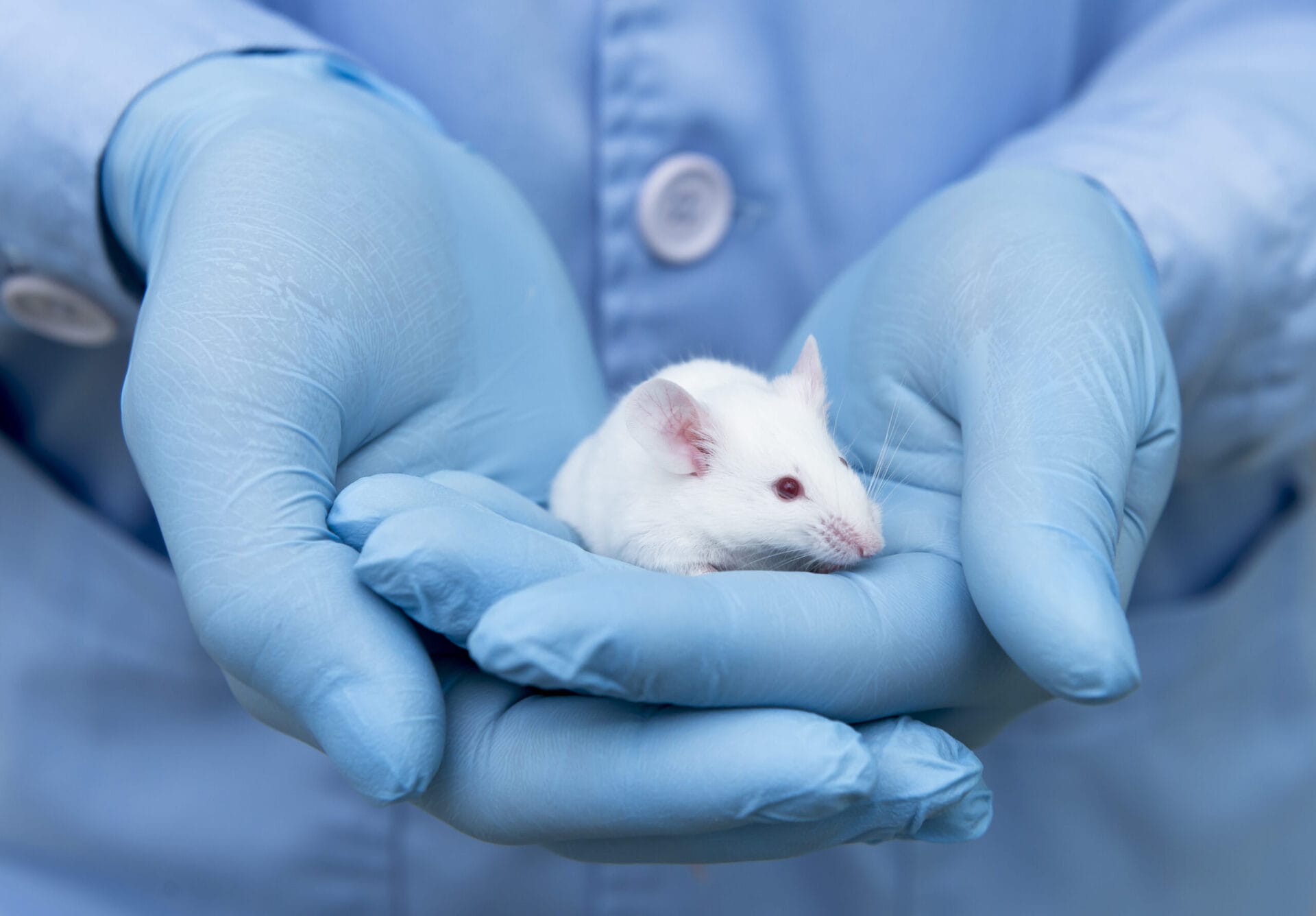Genomic conversations: animals in biomedical research

How do you feel about animals being used in biomedical research? In this conversation page, we’ll explore how animals are used in biomedical research - including some of the benefits and limitations and what the future may hold.
Key terms
Model organism
A species that has been widely studied in biology, usually because it is easy to maintain and breed in a laboratory setting and has particular experimental advantages.
Cancer
A common genetic disease caused by mutations in DNA, and characterised by uncontrolled cell growth.
Vaccine
A type of treatment that provides active acquired immunity against a specific pathogen.
Using animals in biomedical research
Model organisms are non-human species used by scientists to investigate and understand biological processes. For example:
- fruit flies have taught us how different characteristics are passed between generations.
- clawed frogs have revealed important information about how animals grow.
- mice have helped to advance new medicines – including the Covid-19 vaccines, drugs for asthma and nearly all treatments for cancer.
The use of animals in biomedical research stretches back to the days of early Greek scientists like Aristotle. Today, their use remains a legal part of developing new drugs.

In Great Britain in 2022, more than 2.7 million animal procedures were carried out for biomedical research. In the same year, more than 19 million animals were killed for food.
But animal models are not the same as humans. Findings from experiments with animals are not necessarily going to be the same in people. Drugs that work in mice aren’t guaranteed to work or be safe when they’re tested in human clinical trials.
And the use of animals in research is a complex topic, wrapped up in major considerations surrounding ethics, welfare and animal rights.
Different people, different views
Over the next few sections, you’ll hear from Homa, Lise and Marie – three people who work in different departments on the Wellcome Genome Campus. They’ll share their thoughts and feelings about the use of animals in biomedical research.

"Animals are an indispensable part of biological research, but any project should be very well planned to minimise their use."
Homa, Evolutionary biologist

"Animal models have been used extensively in research – but I don’t think they are the best models to study human diseases."
Lise, Research assistant

"There are no circumstances to justify using animals in research. I don’t agree with picking on a weaker species to use in bioscience research just because we can."
Marie, Legal team
A great deal of research is performed without involving animals.
But sometimes, scientists use animals so they can study the complex web of molecules, cells and organs that exist across a whole, living biological system. Since most animals have short life cycles, it’s possible to study their whole life span and several generations in a relatively short space of time.
In this way, we’ve learned a great deal about how our bodies grow, develop and function. Scientists discovered and studied the genes that cause different conditions, leading to countless ways to prevent, diagnose and treat different illnesses.
Animal models also play an important role in the development of new drugs and treatments, ensuring they are safe and effective before they are tested in human clinical trials.
In fact, animal research has played a vital part in nearly every medical breakthrough over the past century. This includes the development of inhalers for asthma, antiretroviral therapies that help people manage their HIV, nearly all cancer treatments, and many vaccines – including those used to prevent Covid-19.
Different people, different views
“From my perspective, there are no situations where we can justify using animals in research.” - Marie
“Animals can teach us so much about biomedical science – from understanding how cells work to developing and testing new drugs. Animal models provide complex, multicellular organisms to perform research in, which we can’t yet simulate with computer models or in cell cultures.” - Homa
“Animal models have helped us to understand the causes of a variety of diseases and how they can be treated. We can use them to explore the mechanisms underlying diseases and then use this information to find potential targets for new treatments.” - Lise
Are there benefits of using animals in biomedical research?
Despite the similarities between humans and animal models – genetically, biologically and in terms of the diseases we are all susceptible to – there are also many differences.
This can mean that some of the findings from animal experiments are not the same in humans. For example, a gene that does one thing in fruit flies might work differently in humans. Similarly, a promising drug might be safe and effective when tested in mice – but it might be ineffective or have dangerous side effects when tested in humans.
Logistically, although animals vary in their needs, it is expensive to use model organisms in research. Breeding, housing, looking after and running experiments with animals take a lot of time and money.
Additionally, many people have questions and concerns about the ethics and morals surrounding the use of animals in research.
Different people, different views
“Animals and humans don’t share the same genome – so the research might not be fully reflective. For example, a drug might pass initial tests in mice, but not be effective in humans. It’s also worth noting that animal tests are time-consuming and expensive, and there are ethical issues to consider.” - Lise
“Animal models have been absolutely pivotal in our understanding of biology.” - Homa
“If we are not prepared to conduct the same research on humans, then why should animals be subjected to the same?” - Marie
Are there limitations of using animals in biomedical research?
The use of animals in research is highly regulated. In the UK, everyone who works with animals must undergo necessary training, and the research must be carried out in licensed premises.
The UK Animals Act of 1986 ensures that any research using animals must be fully assessed to minimise harm and distress. There are also strict welfare rules for how animals are housed and treated.
In the UK and most other countries, animals can only be used in research if there is no alternative. Researchers are required to follow a set of principles called the 3Rs:
- Replace animals with alternative models or avoid their use altogether.
- Reduce the number of animals used and use statistical methods to determine the minimum number that can be used in an experiment.
- Refine the way experiments are carried out to minimise suffering and maximise welfare.
Moreover, poor animal care represents bad science. If animals are not well-treated, the results they produce cannot be trusted or replicated – an important hallmark of science.
Different people, different views
“The current regulations make sure animals aren’t used if there is an alternative available – which I think is fair.” - Lise
“I’m grateful that there are guidelines to attempt to protect animals. However, guidance does not guarantee compliance. I feel laws and regulations should ban the use of animals in research altogether.” - Marie
“Some countries have better regulations than others. To minimise the use of animals, all research projects should be very well planned and start with testing in tissue cultures or similar – which can show whether a drug is toxic before it’s tested on a living mouse.” - Homa
What are the laws and regulations surrounding the use of animals in biomedical research?
By law, all drugs must currently be tested on animals before they can be used in humans. However, many scientists are committed to finding alternatives to much of – or in some cases, the entirety of – the biomedical research process.
The challenge is developing models that can reliably and accurately mimic the complex physiological processes that can currently only be studied in a whole, living organism.
Some alternatives currently being used and explored for the development of new medicines include:
- Cell cultures: cells grown on a flat 2D surface or around a 3D structure to study the effect of potential drug compounds in cells.
- Organoids: ‘mini organs’, or clusters of different cell types, that can be grown in the lab and watched under the microscope. For example, ‘mini bowels’ can tell us about bowel cancer and be used to test promising new drugs.
- Organ-on-a-chip: a tiny piece of tissue, housed on what looks like a clear computer USB stick. The chip gives a micro-scale representation of an organ by mimicking properties, such as the breathing motions of a lung.
- Computer models and artificial intelligence: to predict whether a new drug will be effective and safe inside the body and to simulate human biology and diseases.
As technology develops, these models are becoming increasingly sophisticated.
Different people, different views
“Virtual simulations and cell cultures should be used and encouraged as much as possible – but they’re not always viable. Countless times, a drug has worked fine in theory or in a petri dish but failed when tested in a complex organism.” - Homa
“I would always encourage using alternatives to animals in biomedical research. There are plenty of ways to conduct research without resorting to using animals as if they are objects.” - Marie
“Some alternatives are actually more reflective of human disease as they use human tissue or stem cells. We can also learn about human disease using bioinformatics and statistical analysis, without using animal models.” - Lise
What are the alternatives to using animals in biomedical research?
At present, animals are still an indispensable part of biomedical research. A major challenge remains that many of the available alternatives do not accurately mimic the complexities of entire living organisms.
But we are moving towards a world that relies less on animals. In 2023, the UK Home Office published a report showing a 10% decrease in the overall number of experiments carried out on animals since the previous year – and that number continues to shrink.
As technology improves, so too will the alternative models we have available to perform biomedical research with. It’s likely that the future of research will continue to focus on optimising these models and minimising the use of animals whenever possible.
Different people, different views
“I believe that eventually, we will completely stop using animals in biomedical research. Technology improves each day and better models are always becoming available.” - Lise
“As long as biology exists as a field, we’ll have to use animals to some extent. I also think we need more appreciation for all animals involved in research, not just the conventionally cute ones. Worms, fruit flies and fish have all been pivotal in our understanding of biology.” - Homa
“I hope that in the future, we no longer use animals in biomedical research.” - Marie